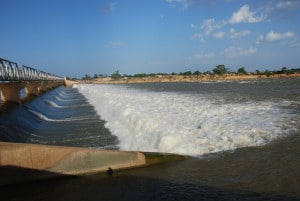The future of water takes shape in Montpellier
Montpellier is a European reference center for water sciences. Focus on one of the UM's flagship themes. Intense rainfall and devastating floods, groundwater pollution, preservation of coastal areas, irrigation, the need to redefine resource management in the face of a growing world population...
 In recent years, water has taken center stage in media and political debates. Montpellier, which faces the Mediterranean, has not waited for this recent interest to address a vital issue for humanity. With more than 500 scientists and doctoral students attached to 14 research unitsThe city occupies an unrivalled position in Europe as a crossroads for research in the water and environment sectors.
In recent years, water has taken center stage in media and political debates. Montpellier, which faces the Mediterranean, has not waited for this recent interest to address a vital issue for humanity. With more than 500 scientists and doctoral students attached to 14 research unitsThe city occupies an unrivalled position in Europe as a crossroads for research in the water and environment sectors.
Dedicated institute, global competitiveness cluster, Mediterranean observatory...
- Since its launch in 2013, the Institut Montpellierrain de l'Eau et de l'Environnement (IM2E), has been bringing together all the players involved in research on the two now inseparable themes of water and the environment (sustainable development, climate change, energy, agronomy...).
- With its multi-disciplinary approach, IM2E works closely with the OREME (Observatoire de recherche méditerranéen de l'environnement) observatory for the sciences of the universe, which has a privileged link with the Sète marine station.
- Montpellier is home to the headquarters of a world-class competitiveness cluster dedicated to water sciences. One of its aims is to foster synergies between public research and private players.
It was the existence of this ecosystem that earned the city the right to host the 13th World Water Congress in 2008, and the Avenir de l'eau (Future of Water) days in 2015. The idea behind this event, organized by IM2E (in association with the French committees of the international hydrology and hydrogeology associations), is to bring together young professionals in the sector to highlight the innovative approaches that will change tomorrow's world.
Training with an international outlook
Backed by this strong research potential, UM's water science training offers a wide range of courses adapted to specific professions. Every year, it welcomes a large number of students from all over the world, particularly from developing countries, helping to strengthen links between all those involved in global change.
For many years now, the University of Montpellier has been home to the Polytech engineering program in water science and technology. This develops skills in hydraulics, water treatment, hydrobiology and ecology.
In addition to this course, the UM now runs the 6 other courses in the Water Science Master's program at the Faculty of Science:
- Hydrology, risk, environment
- Quantitative and qualitative hydrogeology
- Water and coastline (idem coastal and marine management)
- Water contaminants and health
- Water and agriculture
- Water and society
Image: Copyright Alain Dezetter